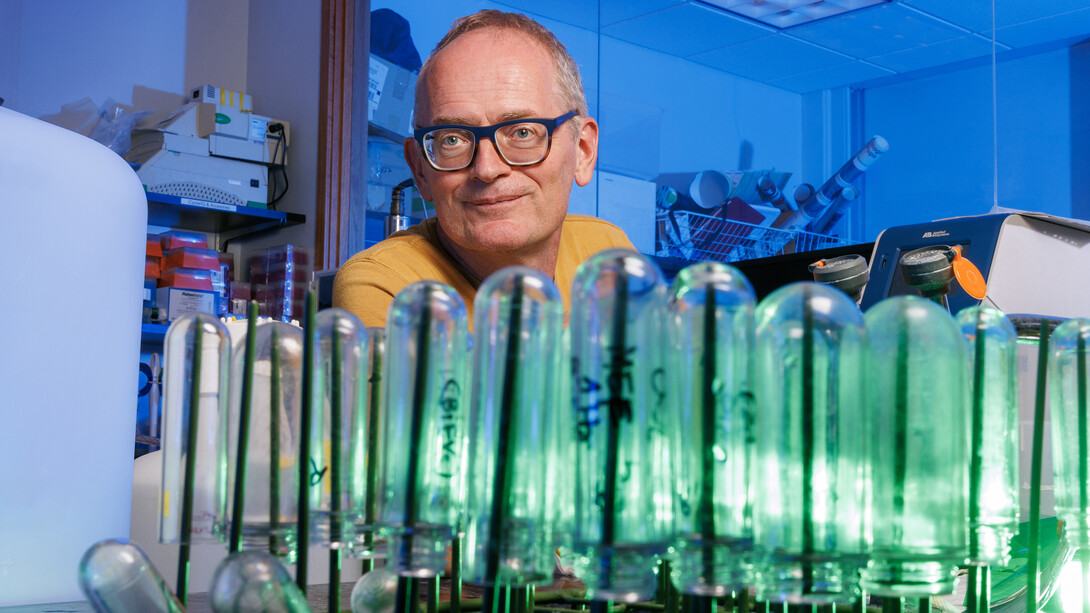
A University of Nebraska–Lincoln research team has achieved a key milestone in a national competition to advance targeted genome editing. Their work could help lead to new treatments for both common and rare diseases.
Janos Zempleni, Willa Cather Professor of molecular nutrition, leads one of the 14 teams receiving a Phase 2 prize in the National Institutes of Health’s Targeted Genome Editor Delivery (TARGETED) Challenge. It is a three-phase competition with prizes totaling $6 million; Zempleni and Jiantao Guo, professor of chemistry, were among the 30 winners in Phase 1.
Zempleni’s second-round win, which comes with a $250,000 prize, places Nebraska among a group of prestigious national research institutions and enables the team to compete in the initiative’s third phase. The team’s success showcases the potential for major breakthroughs at the intersection of biomedical science and agriculture.
“I’m so happy to be announced as a winner in Phase 2; it was very competitive and not an easy thing to achieve,” Zempleni said. “To be part of this elite group highlights Nebraska’s capacity for cutting-edge research and shows that an agriculture-driven state can still do biomedical research.”
In addition to Zempleni, the team includes Guo and Leila Strickland, a researcher based in Durham, North Carolina.
With the award, Zempleni’s team will advance work on “designer milk exosomes,” which are natural nanoparticles from milk that can be loaded with various types of cargo, including therapeutics, plasmids or, in the case of the TARGETED Challenge, gene editors capable of deleting, repairing or replacing disease-causing DNA. When certain peptides — short amino acid chains — are attached to these designer exosomes, they can transport gene editing technology to the precise tissues and organs associated with a given disease. This capability would overcome one of the most significant hurdles to current gene therapy treatments: the inability to guarantee that a critical mass of gene editors will reach the intended cells.
In Zempleni’s approach, the three peptides work in concert to fortify the exosomes’ survivability and ensure they reach their intended destination. With first-round funding, Zempleni demonstrated the technology’s flexibility by successfully targeting exosome delivery to the heart, pancreas and brain. Now, with Phase 2 funding, he will show scalability. Large-scale production, he said, is a built-in advantage to his approach, as milk contains approximately 1014 exosomes per milliliter.
“The beauty is we can take the exosomes out of cow’s milk,” Zempleni said. “We have an unlimited supply of the vehicle, we just have to modify it by attaching our synthetically made peptides. In theory, we could deliver these exosomes in large quantities tomorrow.”
The funding will also enable Zempleni to hire two additional researchers — senior research assistants, postdoctoral researchers or students — to work on the project, highlighting how university research drives the recruitment and retention of talent to Nebraska, fueling the state’s economy.
Phase 3 of the TARGETED Challenge is divided into two stages. In Phase 3a, research teams will demonstrate that their technology is ready for large animal testing. Groups that successfully complete this portion of the work will receive additional prize funding and advance to Phase 3b, where their technologies will undergo independent testing and validation in large animal models. The top-performing approaches in Phase 3b will receive up to $625,000.
The challenge is expected to conclude in 2027 with the announcement of the final winners, who will demonstrate that their technology successfully delivers genome-editing tools to target tissues. The challenge is funded through the NIH Common Fund’s Somatic Cell Genome Editing program.
Zempleni is a nationally recognized expert in milk exosomes and has made significant headway in showing their commercial potential. Earlier this year, he and Guo launched a startup company, Minovacca, which aims to bring to market designer milk exosomes that can deliver therapeutics, gene editing tools, plasmids and more to targeted locations in the human body. NUtech Ventures, the university’s nonprofit commercialization affiliate, has filed a patent for the technology that includes major markets outside the United States, and plans to file a second soon.
Zempleni’s work related to the TARGETED Challenge builds on his milk exosome research supported by a U.S. Department of Agriculture-National Institute of Food and Agriculture grant through the Agriculture and Food Research Initiative Nanotechnology A1511 program. The use of designer milk exosomes for treating rare diseases is currently being tested in research sponsored by the SynGAP Research Fund and the Foundation for Prader-Willi Research.
Share
News Release Contact(s)
Related Links
Tags
High Resolution Photos








